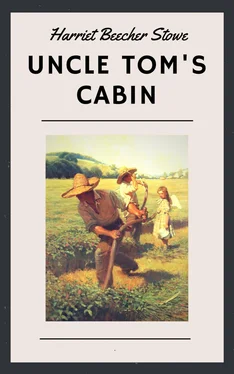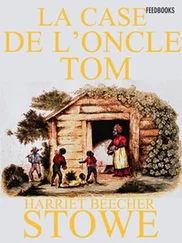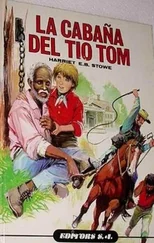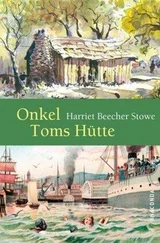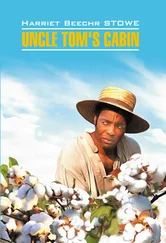Title Page UNCLE TOM’S CABIN by Harriet Beecher Stowe
VOLUME I
CHAPTER I - In Which the Reader Is Introduced to a Man of Humanity
CHAPTER II - The Mother
CHAPTER III - The Husband and Father
CHAPTER IV - An Evening in Uncle Tom’s Cabin
CHAPTER V - Showing the Feelings of Living Property on Changing Owners
CHAPTER VI - Discovery
CHAPTER VII - The Mother’s Struggle
CHAPTER VIII - Eliza’s Escape
CHAPTER IX - In Which It Appears That a Senator Is But a Man
CHAPTER X - The Property Is Carried Off
CHAPTER XI - In Which Property Gets into an Improper State of Mind
CHAPTER XII - Select Incident of Lawful Trade
CHAPTER XIII - The Quaker Settlement
CHAPTER XIV - Evangeline
CHAPTER XV - Of Tom’s New Master, and Various Other Matters
CHAPTER XVI - Tom’s Mistress and Her Opinions
CHAPTER XVII - The Freeman’s Defence
CHAPTER XVIII - Miss Ophelia’s Experiences and Opinions
VOLUME II
CHAPTER XIX - Miss Ophelia’s Experiences and Opinions Continued
CHAPTER XX - Topsy
CHAPTER XXI - Kentuck
CHAPTER XXII - “The Grass Withereth—the Flower Fadeth”
CHAPTER XXIII - Henrique
CHAPTER XXIV - Foreshadowings
CHAPTER XXV - The Little Evangelist
CHAPTER XXVI - Death
CHAPTER XXVII - “This Is the Last of Earth” *
CHAPTER XXVIII - Reunion
CHAPTER XXIX - The Unprotected
CHAPTER XXX - The Slave Warehouse
CHAPTER XXXI - The Middle Passage
CHAPTER XXXII - Dark Places
CHAPTER XXXIII - Cassy
CHAPTER XXXIV - The Quadroon’s Story
CHAPTER XXXV - The Tokens
CHAPTER XXXVI - Emmeline and Cassy
CHAPTER XXXVII - Liberty
CHAPTER XXXVIII - The Victory
CHAPTER XXXIX - The Stratagem
CHAPTER XL - The Martyr
CHAPTER XLI - The Young Master
CHAPTER XLII - An Authentic Ghost Story
CHAPTER XLIII - Results
CHAPTER XLIV - The Liberator
CHAPTER XLV - Concluding Remarks
Imprint
UNCLE TOM’S CABIN
by Harriet Beecher Stowe
CHAPTER I - In Which the Reader Is Introduced to a Man of Humanity
Late in the afternoon of a chilly day in February, two gentlemen were sitting alone over their wine, in a well-furnished dining parlor, in the town of P——, in Kentucky. There were no servants present, and the gentlemen, with chairs closely approaching, seemed to be discussing some subject with great earnestness.
For convenience sake, we have said, hitherto, two gentlemen . One of the parties, however, when critically examined, did not seem, strictly speaking, to come under the species. He was a short, thick-set man, with coarse, commonplace features, and that swaggering air of pretension which marks a low man who is trying to elbow his way upward in the world. He was much over-dressed, in a gaudy vest of many colors, a blue neckerchief, bedropped gayly with yellow spots, and arranged with a flaunting tie, quite in keeping with the general air of the man. His hands, large and coarse, were plentifully bedecked with rings; and he wore a heavy gold watch-chain, with a bundle of seals of portentous size, and a great variety of colors, attached to it,—which, in the ardor of conversation, he was in the habit of flourishing and jingling with evident satisfaction. His conversation was in free and easy defiance of Murray’s Grammar,* and was garnished at convenient intervals with various profane expressions, which not even the desire to be graphic in our account shall induce us to transcribe.
* English Grammar (1795), by Lindley Murray (1745-1826), the
most authoritative American grammarian of his day.
His companion, Mr. Shelby, had the appearance of a gentleman; and the arrangements of the house, and the general air of the housekeeping, indicated easy, and even opulent circumstances. As we before stated, the two were in the midst of an earnest conversation.
“That is the way I should arrange the matter,” said Mr. Shelby.
“I can’t make trade that way—I positively can’t, Mr. Shelby,” said the other, holding up a glass of wine between his eye and the light.
“Why, the fact is, Haley, Tom is an uncommon fellow; he is certainly worth that sum anywhere,—steady, honest, capable, manages my whole farm like a clock.”
“You mean honest, as niggers go,” said Haley, helping himself to a glass of brandy.
“No; I mean, really, Tom is a good, steady, sensible, pious fellow. He got religion at a camp-meeting, four years ago; and I believe he really did get it. I’ve trusted him, since then, with everything I have,—money, house, horses,—and let him come and go round the country; and I always found him true and square in everything.”
“Some folks don’t believe there is pious niggers Shelby,” said Haley, with a candid flourish of his hand, “but I do . I had a fellow, now, in this yer last lot I took to Orleans—‘t was as good as a meetin, now, really, to hear that critter pray; and he was quite gentle and quiet like. He fetched me a good sum, too, for I bought him cheap of a man that was ’bliged to sell out; so I realized six hundred on him. Yes, I consider religion a valeyable thing in a nigger, when it’s the genuine article, and no mistake.”
“Well, Tom’s got the real article, if ever a fellow had,” rejoined the other. “Why, last fall, I let him go to Cincinnati alone, to do business for me, and bring home five hundred dollars. ‘Tom,’ says I to him, ‘I trust you, because I think you’re a Christian—I know you wouldn’t cheat.’ Tom comes back, sure enough; I knew he would. Some low fellows, they say, said to him—Tom, why don’t you make tracks for Canada?’ ’Ah, master trusted me, and I couldn’t,’—they told me about it. I am sorry to part with Tom, I must say. You ought to let him cover the whole balance of the debt; and you would, Haley, if you had any conscience.”
“Well, I’ve got just as much conscience as any man in business can afford to keep,—just a little, you know, to swear by, as ’t were,” said the trader, jocularly; “and, then, I’m ready to do anything in reason to ’blige friends; but this yer, you see, is a leetle too hard on a fellow—a leetle too hard.” The trader sighed contemplatively, and poured out some more brandy.
“Well, then, Haley, how will you trade?” said Mr. Shelby, after an uneasy interval of silence.
“Well, haven’t you a boy or gal that you could throw in with Tom?”
“Hum!—none that I could well spare; to tell the truth, it’s only hard necessity makes me willing to sell at all. I don’t like parting with any of my hands, that’s a fact.”
Here the door opened, and a small quadroon boy, between four and five years of age, entered the room. There was something in his appearance remarkably beautiful and engaging. His black hair, fine as floss silk, hung in glossy curls about his round, dimpled face, while a pair of large dark eyes, full of fire and softness, looked out from beneath the rich, long lashes, as he peered curiously into the apartment. A gay robe of scarlet and yellow plaid, carefully made and neatly fitted, set off to advantage the dark and rich style of his beauty; and a certain comic air of assurance, blended with bashfulness, showed that he had been not unused to being petted and noticed by his master.
“Hulloa, Jim Crow!” said Mr. Shelby, whistling, and snapping a bunch of raisins towards him, “pick that up, now!”
The child scampered, with all his little strength, after the prize, while his master laughed.
“Come here, Jim Crow,” said he. The child came up, and the master patted the curly head, and chucked him under the chin.
Читать дальше
